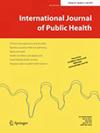Key Determinants of COVID-19 Vaccination Take-Up in Remote Rural Areas: Evidence From Colombia
IF 2.6
3区 医学
Q2 PUBLIC, ENVIRONMENTAL & OCCUPATIONAL HEALTH
引用次数: 0
Abstract
The adoption of vaccines was a crucial factor in overcoming the COVID-19 pandemic. However, vaccination rates between rural and urban areas varied greatly. In this paper, our objective is to understand the individual and institutional factors associated with the uptake of vaccines in remote rural areas in Colombia.We interviewed a random sample of 800 households (1,592 individuals) in remote rural areas of Antioquia (Colombia) during February 2022 when vaccinations were available. Then, we use a linear probability model to explain the uptake of the COVID-19 vaccine.The results indicate that the probability of having at least the first dose of the COVID-19 vaccine is positively associated with access to information, trust in police and army, and the perceived risk of contracting COVID-19. Trust in the church is negatively related to vaccination.Institutions can play a critical role in the management of pandemics. Timely information on the risks associated with the disease and perceived riskiness are key factors that mobilize the population to take the COVID-19 vaccine.偏远农村地区接种 COVID-19 疫苗的关键决定因素:来自哥伦比亚的证据
采用疫苗是战胜 COVID-19 大流行的关键因素。然而,农村和城市地区的疫苗接种率差异很大。在本文中,我们的目标是了解与哥伦比亚偏远农村地区疫苗接种率相关的个人和机构因素。我们在 2022 年 2 月疫苗接种期间对安蒂奥基亚(哥伦比亚)偏远农村地区的 800 户家庭(1,592 人)进行了随机抽样采访。结果表明,至少接种第一剂 COVID-19 疫苗的概率与信息获取、对警察和军队的信任以及感染 COVID-19 的感知风险正相关。对教会的信任与疫苗接种呈负相关。有关疾病风险的及时信息和风险感知是动员民众接种 COVID-19 疫苗的关键因素。
本文章由计算机程序翻译,如有差异,请以英文原文为准。
求助全文
约1分钟内获得全文
求助全文
来源期刊

International Journal of Public Health
医学-公共卫生、环境卫生与职业卫生
CiteScore
4.20
自引率
2.20%
发文量
269
审稿时长
12 months
期刊介绍:
The International Journal of Public Health publishes scientific articles relevant to global public health, from different countries and cultures, and assembles them into issues that raise awareness and understanding of public health problems and solutions. The Journal welcomes submissions of original research, critical and relevant reviews, methodological papers and manuscripts that emphasize theoretical content. IJPH sometimes publishes commentaries and opinions. Special issues highlight key areas of current research. The Editorial Board''s mission is to provide a thoughtful forum for contemporary issues and challenges in global public health research and practice.
 求助内容:
求助内容: 应助结果提醒方式:
应助结果提醒方式:


